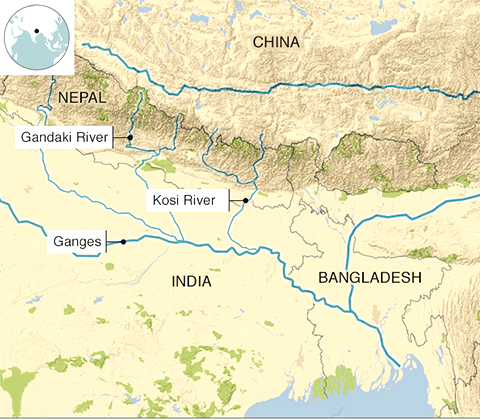Bihar Switch to Hindi
Bihar Floods Recognised as National Priority
Why in News?
Recently, The Union Budget 2024 allocated Rs 11,500 crore for harnessing and utilizing the waters of Kosi - a river that is known to be highly unpredictable and prone to shifting its course.
- The Kosi river is referred to as the "sorrow of Bihar" due to the widespread destruction it causes across a large area in the northern part of the state after flowing in from Nepal.
Key Points
- According to the sources, it was the first time the problem of floods in Bihar was recognized as a national priority.
- The state received significant benefits despite not obtaining special category status, including four expressways, a two-lane bridge over the Ganga, a power plant, airports, and medical colleges.
- Additionally, the Budget announced an industrial node in Gaya, sports infrastructure, and assistance for accessing funds from multilateral institutions.
- Development plans for the Vishnupad and Mahabodhi temple corridors in Gaya, as well as Rajgir and Nalanda, were also highlighted.
Kosi River System
- The Kosi is a trans-boundary river which flows through Tibet, Nepal and India.
- It has its source in Tibet that includes the world's highest upland, it then drains a large part of Nepal before emerging onto the Gangetic plains.
- Its three major tributaries, the Sun Kosi, Arun and Tamur meet at one point just upstream of a 10 km gorge cut through the Himalayan foothills.
- The river crosses into northern Bihar where it branches into distributaries before joining the Ganges near Kursela in Katihar district.
- The Kosi carries the maximum amount of silt and sand after the Brahmaputra in India.
- It is also known as the “Sorrow of Bihar” as the annual floods affect about 21,000 sq. km. of fertile agricultural lands thereby disturbing the rural economy.


Bihar Switch to Hindi
Bihar Passes Bill to Prevent Paper Leaks
Why in News?
Recently, The Bihar Assembly passed Bihar Public Examinations (PE) (Prevention of Unfair Means) Bill, 2024 aimed to curb the questions paper leaks and other malpractices in government recruitment examinations in the State.
Key Points
- All crimes under this law will be cognisable and non-bailable.
- It defines various offences related to unfair means, such as paper leaks, the use of fake websites, and collusion with service providers.
- The Bill includes provisions for imprisonment terms of three to five years and a fine of Rs. 10 lakh.
- If a service provider, whether a government entity or a private agency, engages in malpractices, it will face a fine of Rs. 1 crore and a four-year termination of its services.
Public Examinations (Prevention of Unfair Means) Bill, 2024
- This bill was passed by the central government which aimed at addressing the issue of malpractices in government recruitment examinations. It came into effect on 21st June 2024.
- Key Features:
- It defines various offences related to unfair means, such as paper leaks, the use of fake websites, and collusion with service providers.
- It prescribes strict penalties, including a minimum jail term of 3-5 years and a fine up to Rs. 1 crore.
- It holds service providers engaged for exam conduct liable with fines up to Rs 1 crore and a 4-year ban on their involvement in public exams.
- It empowers police officers not below the rank of Deputy Superintendent of Police or Assistant Commissioner of Police to investigate offences under the Act.
- It will cover a wide range of central government recruitment exams, including those conducted by UPSC, SSC, RRBs, IBPS, and NTA.










%20MPPCS%202025%20Desktop%20E.jpg)
%20MPPCS%202025%20Mobile%20E%20(1).jpg)










.png)
.png)











 PCS Parikshan
PCS Parikshan


